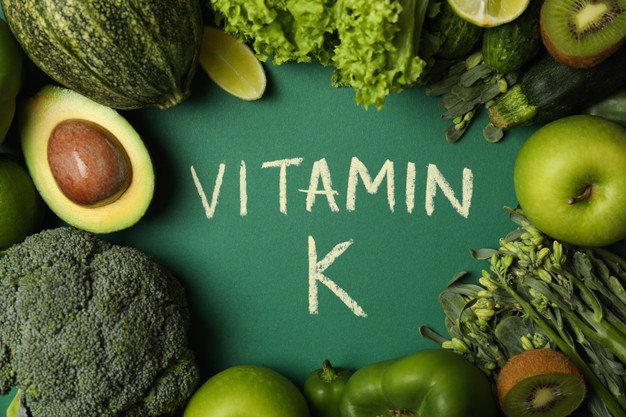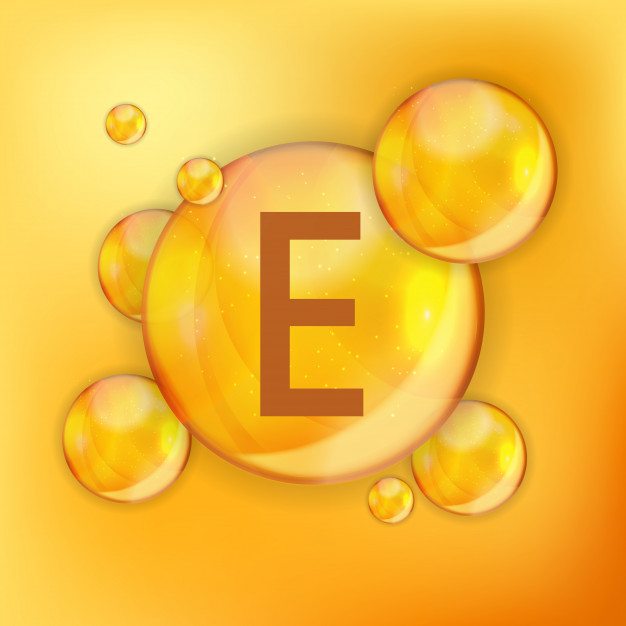Vitamin K is the only fat soluble vitamin that has a specific coenzyme function. It plays significant role in synthesizing several proteins within body, which are essentially required for building bones as well as for blood coagulation. It also exerts various other biochemical activities within body that ultimately help to enhance the overall nutritional status hence improve health.
Chemistry
- Vitamin K is found in different forms, which include phylloquinone (Vitamin K1), menaquinone (Vitamin K2) and menadione (Vitamin K3)
- Phylloquinone is generally present in green leafy vegetables like kale, spinach, collard greens etc
- On a contrary menaquinone is naturally found in animal foods as well as in fermented foods. It can also be synthesized within body by bacteria
- Whereas menadione is a synthetic from
- Vitamin K1, K2 and K3 are the derivatives of naphthoquinone
- Vitamin K1 and K2 both contain isoprenoid side chain in their structure
- All of these three vitamins are heat stable but they can be easily destroyed by strong acids or alkalis or irradiation or oxidizing agents
- Some antagonists of Vitamin K are also found, which include heparin, salicylates, bishydroxycoumarin, dicumarol etc
Sources
Foods rich in Vitamin K are listed below –
- Natto
- Spinach
- Parsley
- Beet greens
-
 Broccoli
Broccoli - Cabbages
- Cooked collard greens
- Cooked mustard greens
- Swiss chard
- Hard cheese
- Soft cheese
- Jarlsberg Cheese
- Blue cheese
- Edam Cheese
- Cheddar cheese
- Butter
- Whole milk
- Cream
- Avocado
- Kiwi
- Soybean oil
- Green peas
- Brussels sprouts
- Green beans
- Chicken
- Bacon
- Duck especially duck breast
- Prunes
- Pork
- Beef especially beef liver
- Egg yolk
- Black berry
- Blue berry
- Tomatoes
- Pomegranate
- Figs
- Grapes
- Pine nut
- Walnuts
- Cashews
- Hazelnuts
- Red kidney bean
- Cauliflower
- Alfalfa
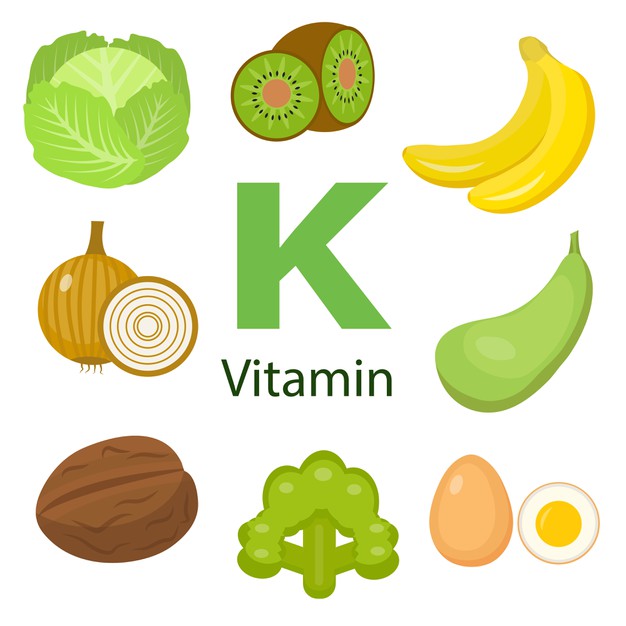
Absorption, storage and transport of Vitamin K
- Though Vitamin K is synthesized within body by intestinal bacteria but the absorption of dietary Vitamin K is taken place within small intestine
- Vitamin K requires bile salt as well as chylomicrons for its absorption
- Vitamin K is stored mainly in liver
- It also found in some other organs like brain, bone, pancreas and heart
- It is transported along with LDL within the body

Health benefits
Role on blood coagulation
- It plays vital role in stimulating the blood clotting process
- It is associated with synthesizing a protein called prothrombin, which helps in blood coagulation
- It also helps in the post-translational modification of various blood clotting factors involved in blood coagulation
- It helps to convert various coagulation factors (factor II, VII, IX and X) into their mature form as well that ultimately facilitates blood coagulation
Role on wound healing
- Consumption of Vitamin K is very effective for accelerating the process of wound healing
- It is closely related with increasing the rate of wound contraction, enhancing epithelialization period and promoting the synthesis of fibroblasts cells, which eventually help in rapid wound healing
Role on skeletal health
- It helps to synthesize osteocalcin (a protein), which aids in the production of healthy bone tissue
- It helps to enhance bone mineral density as well
- It also helps to maintain the strength of bones and prevents the prevalence of bone fractures
- Poor consumption of Vitamin K can increases the risk of developing osteoporosis
Role on cognitive health
- It has seen that an increase in the vitamin K level in blood helps to improve episodic memory, especially in older people
- Vitamin K1 (phylloquinone) is extremely helpful for improving cognitive ability and memory

Role on cardiovascular system
- Vitamin K2 (menaquinone) plays significant role in preventing calcium accumulation within arteries. This type of mineralization (building up of minerals within arteries) is considered as one of the major causative factor of cardiac morbidity and mortality. Consumption of Vitamin K2 significantly reduces the risk of developing cardio vascular diseases as it helps to prevent mineralization of artery
- It helps to reduce blood pressure as well and helps to make the heart able to pump blood freely throughout the body
- It also helps to decrease the susceptibility of strokes and heart attacks
Other health benefits
- Consuming Vitamin K or administration of Vitamin K directly into vein is very much helpful for reversing too much thinning of blood caused by warfarin
- Athletes can consume Vitamin K for improving their performance, as it is associated with improving the functionality of heart hence it may also improve exercise performance
- Consumption of Vitamin K2 along with calcium and Vitamin D help to increase bone mass among those children who suffer from beta thalassemia
- It also helps to decrease the risk of developing breast cancer
- Individual suffers from multiple sclerosis, generally takes interferon as medicine for treating the condition but interferon may develop rashes on skin and also responsible for a burning sensation. Vitamin K plays significant role in preventing these side effects of interferon
- It is very effective for inhibiting joint swelling hence its consumption is so beneficial for preventing arthritis. It is better to consume arthritis medicine along with Vitamin K for rapid relief

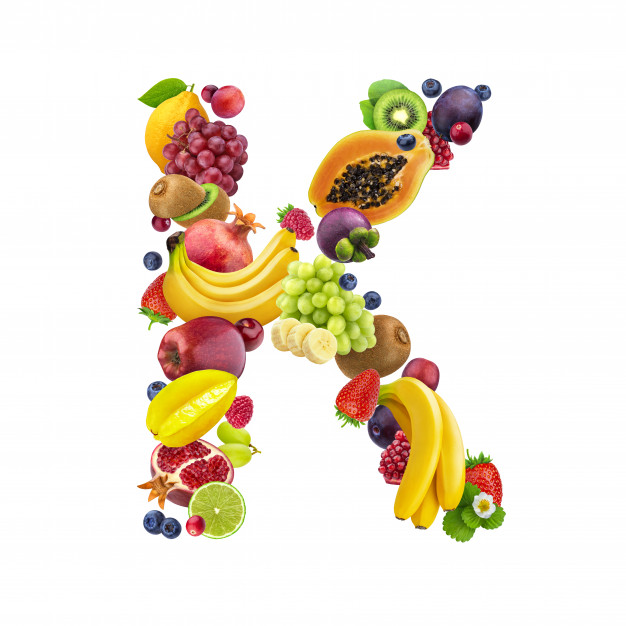
Recommended dietary allowance
- Infant of 0 to 6 months of age should consume 2 micrograms of Vitamin K daily whereas infants of 7 to 12 months of age should consume 2.5 micrograms of Vitamin K per day for fulfilling its requirement
- The requirements of Vitamin K is estimated 30 micrograms per day for children of 1 to 3 years, 55 micrograms daily for children of 4 to 8 years and 60 micrograms per day for those children who belong to the age group of 9 to 13 years
- Girls and boys of 14 to 18 years of age should consume 75 micrograms of Vitamin K daily for meeting the requirements of Vitamin K
- Adult women should consume 90 micrograms of Vitamin K daily where as adult men should consume 120 micrograms of Vitamin K per day
Disease state
Deficiency disorders
- Though the deficiency of Vitamin K is not very common as intestinal beneficial bacteria can synthesize it in body. It has seen that destruction of intestinal bacteria by using antibiotics or poor absorption of Vitamin K or lacking of bile salts or excessive loss of Vitamin K due to diarrhoea can leads to its deficiency
- Deficiency of Vitamin K is responsible for reducing the level of active prothrombin in circulation, which affect the process of blood coagulation very adversely and also increases the blood clotting time
- Prolong deficiency of Vitamin K can also lead to osteoporosis and osteopenia

Hyperactivity
Toxicity of Vitamin K is a rare phenomenon as it is excreted through urine and stool hence excessive Vitamin K does not accumulated within body thus it does not cause severe toxicity. Whereas administration of Vitamin K in large dose or prolong consumption of Vitamin K supplements in excess amount can cause toxicity and develops hemolytic anemia (due to enhanced breakdown of RBC), jaundice, hyperbilirubinemia and kernicterus especially in infants.
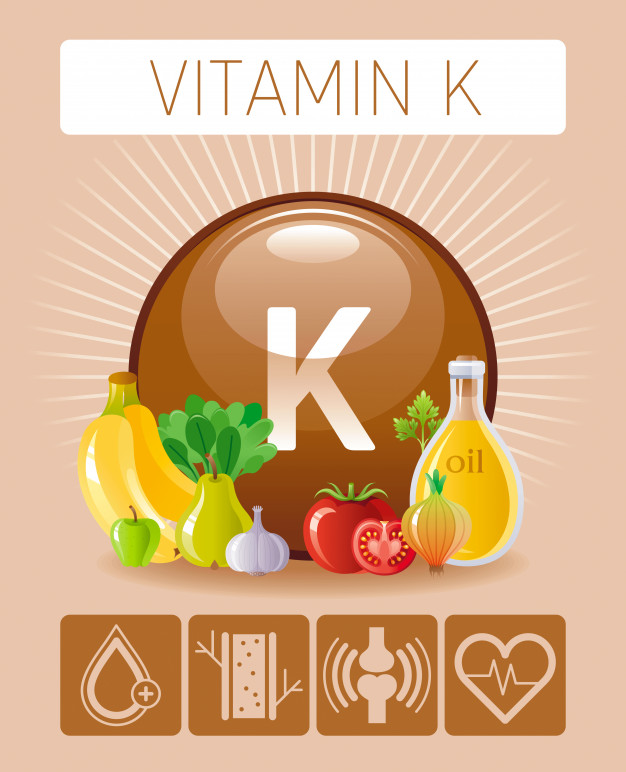
Source:
Berenjian, A., Mahanama, R., Kavanagh, J. and Dehghani, F., 2015. Vitamin K series: current status and future prospects. Critical Reviews in Biotechnology, 35(2), pp.199-208.
Beulens, J.W., Booth, S.L., van den Heuvel, E.G., Stoecklin, E., Baka, A. and Vermeer, C., 2013. The role of menaquinones (vitamin K 2) in human health. British Journal of Nutrition, 110(8), pp.1357-1368.
Booth, S.L., 2009. Roles for vitamin K beyond coagulation. Annual review of nutrition, 29, pp.89-110.
DiNicolantonio, J.J., Bhutani, J. and O'Keefe, J.H., 2015. The health benefits of vitamin K. Open heart, 2(1).
Gröber, U., Reichrath, J., Holick, M.F. and Kisters, K., 2014. Vitamin K: an old vitamin in a new perspective. Dermato-endocrinology, 6(1), p.e968490.
Palmer, C.R., Blekkenhorst, L.C., Lewis, J.R., Ward, N.C., Schultz, C.J., Hodgson, J.M., Croft, K.D. and Sim, M., 2020. Quantifying dietary vitamin K and its link to cardiovascular health: a narrative review. Food & function, 11(4), pp.2826-2837.
Simes, D.C., Viegas, C.S., Araújo, N. and Marreiros, C., 2020. Vitamin K as a Diet Supplement with Impact in Human Health: Current Evidence in Age-Related Diseases. Nutrients, 12(1), p.138.
Villa, J.K.D., Diaz, M.A.N., Pizziolo, V.R. and Martino, H.S.D., 2017. Effect of vitamin K in bone metabolism and vascular calcification: A review of mechanisms of action and evidences. Critical reviews in food science and nutrition, 57(18), pp.3959-3970.
